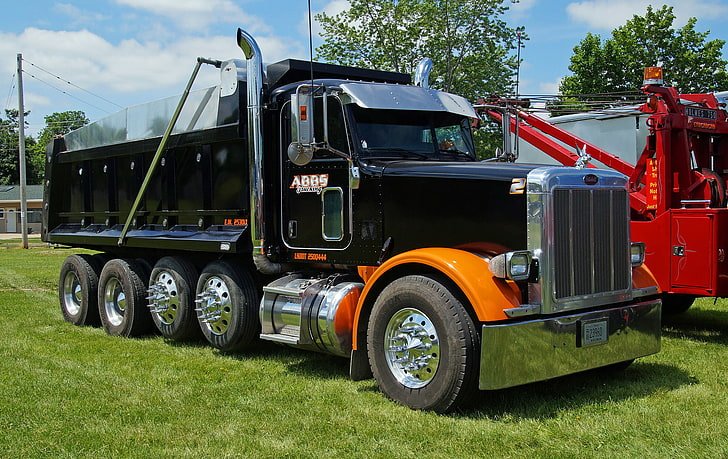Interchange 8A fire tractor trailer on the New Jersey Turnpike is a critical connection for commercial traffic, linking key routes and industrial hubs. Recently, incidents of tractor-trailer fires here have caused major disruptions, highlighting the need for increased safety awareness. In this guide, we’ll dive into the causes of these fires, their effects on traffic, and essential tips to help prevent such incidents.
Why Is Interchange 8A fire tractor trailer a High-Risk Area?
Interchange 8A, located in South Brunswick on the New Jersey Turnpike, connects to Route 32 and serves as a vital route for commercial traffic. With thousands of trucks and tractor-trailers traveling through daily, it’s one of the most congested and high-traffic areas on the Turnpike. This heavy concentration of large vehicles makes Interchange 8A prone to incidents, including fires.
The combination of stop-and-go traffic, extended braking, and the sheer volume of tractor-trailers puts added strain on vehicles and drivers. Frequent braking heats up brake systems, and long hours on the road increase the risk of mechanical failures. With the high number of tractor-trailers carrying potentially flammable cargo, Interchange 8A becomes a hotspot for incidents, like tractor-trailer fires, that disrupt both traffic and safety.
Interchange 8A fire tractor trailer-Trailer Fire Incidents
Over the past year, tractor-trailer fires at Interchange 8A have disrupted traffic multiple times. In May 2023, a fire broke out on the northbound side, causing significant delays as firefighters responded. In July 2024, another tractor-trailer fire on the southbound side added to the series of incidents that have raised concerns about road safety in this area.
These fires often occur during peak travel times, making the impact on traffic severe. Emergency responders close lanes to handle the fire, which leads to long backups on an already busy road. The timing and location of these fires suggest that heavy traffic and mechanical stress are likely contributors. For drivers in the area, understanding these risks is key to staying safe and reducing potential hazards.
Common Causes of Tractor-Trailer Fires at Interchange 8A
Understanding why tractor-trailer fires at Interchange 8A happen can help prevent them. Here are some of the main causes:
- Overheated Brakes: With frequent stop-and-go traffic, brakes can overheat and even ignite, especially on heavy trucks. Brake fires are common in areas where vehicles need to slow down frequently, like Interchange 8A.
- Engine and Mechanical Failures: Mechanical issues, such as engine problems or fuel leaks, can lead to fires. Poorly maintained parts can malfunction, and the intense heat generated by an engine in distress can quickly escalate into a fire.
- Improper Cargo Loading: Loose or improperly loaded cargo can shift, creating friction and placing strain on the vehicle’s components. Flammable or hazardous cargo that isn’t securely fastened is especially dangerous.
- Environmental Factors: Hot pavement, road debris, and even weather conditions can exacerbate risks. Extreme heat or prolonged driving in congested areas places additional stress on tractor-trailers, increasing the chances of fire.
By identifying these causes, drivers and trucking companies can take steps to reduce the likelihood of fires, making Interchange 8A safer for everyone.
Traffic Impacts of Tractor-Interchange 8A fire tractor trailer
When a tractor-trailer fire occurs at Interchange 8A, it impacts far more than the vehicle involved. Lane closures are usually necessary, leading to long backups, often stretching for miles. For commuters, this means extended travel times, unexpected detours, and elevated frustration.
The fires also pose safety and environmental risks. Smoke and toxic fumes from a large vehicle fire can be hazardous, especially for nearby drivers and residents. Additionally, the heat and flames can damage road infrastructure, leading to costly repairs and extended closures that compound traffic issues even after the fire is contained.
These incidents stress the need for greater fire prevention awareness and regular maintenance on tractor-trailers, particularly in high-traffic areas like Interchange 8A.
Preventive Tips to Reduce Tractor-Trailer Fires at Interchange 8A fire tractor trailer

Safety is crucial for both drivers and trucking companies to reduce the risk of tractor-trailer fires at Interchange 8A. Here are key preventive measures:
- Routine Maintenance: Consistent checks on brakes, engines, and fuel systems are vital. For large vehicles like tractor-trailers, parts wear down faster, so inspecting tire pressure, brake pads, and fluid levels before every trip is essential.
- Secure Cargo Properly: Properly loading and securing cargo can significantly reduce fire risks. Shifting cargo can cause friction and overheating. Hazardous or flammable materials should be especially secured according to regulations to prevent risks.
- Watch for Warning Signs: Drivers should monitor for unusual smells, smoke, or sounds that could indicate an overheating issue. Addressing these early can prevent problems from escalating.
- Take Scheduled Breaks: Using rest areas as scheduled cooling stops can help reduce brake stress. Interchange 8A’s traffic congestion makes cooling off essential, especially during peak hours.
These precautions can help drivers prevent fires, reduce risks, and contribute to smoother traffic flow along the New Jersey Turnpike.
What to Do if You Encounter a Tractor-Trailer Fire at Interchange 8A
If you come across a tractor-trailer fire at Interchange 8A, your safety is the priority. Here’s what to do:
- Maintain a Safe Distance: Stay as far back as possible to avoid smoke and debris. Moving to an adjacent lane can add an extra layer of safety.
- Follow Emergency Personnel Directions: Emergency responders may need to block lanes to control the situation. Follow their instructions and avoid honking or attempting to pass through the scene.
- Stay Calm and Patient: Fires take time to contain, especially in large vehicles. Remaining patient and cooperative with traffic instructions is crucial to keeping everyone safe.
By taking these actions, you can help ensure your safety and allow emergency responders to work efficiently.
FAQs: About Interchange 8A fire tractor trailer
1. What is Interchange 8A fire tractor trailer?
Interchange 8A fire tractor trailer incidents refer to fires involving large trucks on the New Jersey Turnpike near Interchange 8A.
2. Why do tractor trailers catch fire at Interchange 8A?
Heavy traffic, mechanical issues, and improper cargo loading are common causes of tractor-trailer fires at Interchange 8A.
3. How do these fires affect traffic?
These fires cause major delays, often requiring lane closures, which leads to backups and extended travel times for drivers.
4. What can drivers do to stay safe during a tractor-trailer fire?
Drivers should keep a safe distance, follow emergency personnel instructions, and remain calm to ensure their safety.
Conclusion: Reducing Tractor-Trailer Fires at Interchange 8A fire tractor trailer
Interchange 8A is a vital part of New Jersey’s Turnpike system, but recent tractor-trailer fire incidents emphasize the need for improved safety practices. Preventing these fires requires the combined efforts of drivers, trucking companies, and authorities, with a focus on routine maintenance, careful cargo handling, and safety awareness.
For both the commuting public and commercial drivers, understanding the risks at Interchange 8A can make a significant difference. Through awareness and prevention, we can work together to ensure safer roads, less traffic disruption, and a more secure travel experience for everyone on the New Jersey Turnpike.



